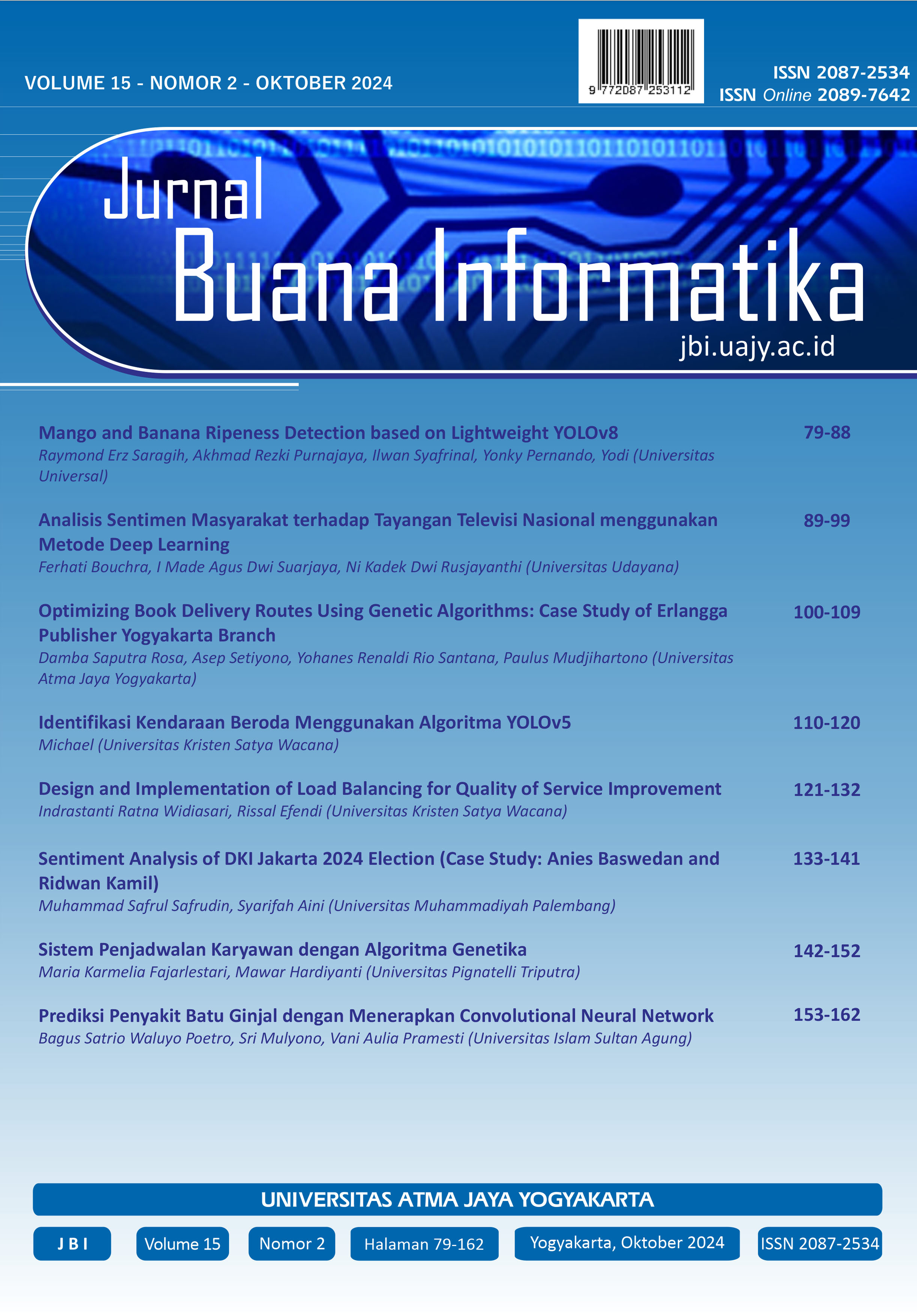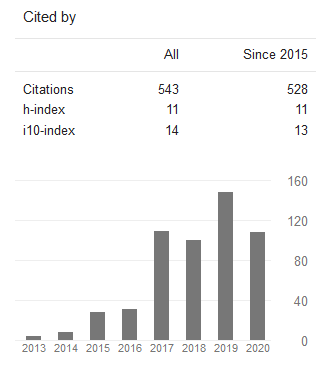Sistem Penjadwalan Karyawan dengan Algoritma Genetika
Keywords:
employee scheduling, genetic algorithm, human resource management, algoritma genetika, manajemen SDM, penjadwalan karyawanAbstract
Employee scheduling is a complex problem in Human Resource Management (HRM) that significantly impacts operational efficiency. This study develops an employee scheduling system using a genetic algorithm. The employee schedules are constructed by considering scheduling rules and various components such as the number of days, shifts, employee quality, and scheduling requests. The genetic algorithm, proven effective in solving various optimization problems, is employed to generate optimal schedules through the processes of selection, crossover, and mutation. The results indicate that the genetic algorithm can effectively produce employee schedules, with fitness values indicating improved schedule quality as iterations increase. The findings of this study are anticipated to be useful in HRM, aiming to improve both employee efficiency and satisfaction.
References
J. Soriano, E. R. Jalao, and I. A. Martinez, “Integrated employee scheduling with known employee demand, including breaks, overtime, and employee preferences,” Journal of Industrial Engineering and Management, vol. 13, no. 3, p. 451, Sep. 2020, doi: 10.3926/jiem.3126.
Q. Zhang, “Research on the Construction Schedule and Cost Optimization of Grid Structure based on BIM and Genetic Algorithm,” Journal of Physics: Conference Series, vol. 1744, no. 2, p. 022065, Feb. 2021, doi: 10.1088/1742-6596/1744/2/022065.
H. R. O. Rocha, I. H. Honorato, R. Fiorotti, W. C. Celeste, L. J. Silvestre, and J. A. L. Silva, “An Artificial Intelligence based scheduling algorithm for demand-side energy management in Smart Homes,” Applied Energy, vol. 282, p. 116145, Jan. 2021, doi: 10.1016/j.apenergy.2020.116145.
H. J. Kaleybar, M. Davoodi, M. Brenna, and D. Zaninelli, “Applications of genetic algorithm and its variants in rail vehicle systems: A bibliometric analysis and comprehensive review,” IEEE Access, vol. 11, pp. 68972–68993, 2023, doi: 10.1109/ACCESS.2023.3292790.
R. Chen, B. Yang, S. Li, and S. Wang, “A self-learning genetic algorithm based on reinforcement learning for flexible job-shop scheduling problem,” Computers & Industrial Engineering, vol. 149, p. 106778, Nov. 2020, doi: 10.1016/j.cie.2020.106778.
Z. Wang and A. Sobey, “A comparative review between genetic algorithm use in composite optimisation and the state-of-the-art in evolutionary computation,” Composite Structures, vol. 233, p. 111739, Feb. 2020, doi: 10.1016/j.compstruct.2019.111739.
L. Manzoni, L. Mariot, and E. Tuba, “Balanced crossover operators in Genetic Algorithms,” Swarm Evol Comput, vol. 54, p. 100646, May 2020, doi: 10.1016/j.swevo.2020.100646.
B. Koohestani, “A crossover operator for improving the efficiency of permutation-based genetic algorithms,” Expert Systems with Applications, vol. 151, p. 113381, Aug. 2020, doi: 10.1016/j.eswa.2020.113381.
M. A. Albadr, S. Tiun, M. Ayob, and F. AL-Dhief, “Genetic Algorithm Based on Natural Selection Theory for Optimization Problems,” Symmetry, vol. 12, no. 11, p. 1758, Oct. 2020, doi: 10.3390/sym12111758.
S. Katoch, S. S. Chauhan, and V. Kumar, “A review on genetic algorithm: past, present, and future,” Multimedia Tools and Applications, vol. 80, no. 5, pp. 8091–8126, Feb. 2021, doi: 10.1007/s11042-020-10139-6.
B. Alhijawi, A. Awajan, “Genetic algorithms: theory, genetic operators, solutions, and applications,” Evolutionary Intelligence, vol. 17, no. 3, pp. 1245–1256, Jun. 2024, doi: 10.1007/s12065-023-00822-6.
R. Salman, Suprapto, and Irfandi, “Analisis Pengaruh Probabilitas Crossover Terhadap Kinerja Algoritma Genetika Dalam Optimasi Penjadwalan Matakuliah,” Jurnal Teknoif Teknik Informatika Institut Teknologi Padang, vol. 11, no. 2, pp. 69–74, Oct. 2023, doi: 10.21063/jtif.2023.V11.2.69-74.
L. P. S. Ardiyani, “Perbandingan Algoritma Genetika dengan Algoritma Steepest Ascent Hill Climbing untuk Optimasi Penjadwalan Kuliah,” Jurnal Nasional Pendidikan Teknik Informatika (JANAPATI), vol. 11, no. 1, p. 63, Apr. 2022, doi: 10.23887/janapati.v11i1.43172.
M. H. P. Swari, C. A. Putra, and I. P. S. Handika, “Analisis Perbandingan Algoritma Genetika dan Modified Improved Particle Swarm Optimization dalam Penjadwalan Mata Kuliah,” Jurnal Nasional Pendidikan Teknik Informatika (JANAPATI), vol. 11, no. 2, pp. 92–101, Aug. 2022, doi: 10.23887/janapati.v11i2.49061.
T. G. Bhagya, “Algortitma Genetik Pada Penjadwalan Transportasi Kapal Laut (Studi Kasus PT. Pelni),” Journal of Industrial and Manufacture Engineering, vol. 5, no. 2, Nov. 2021, doi: 10.31289/jime.v5i2.5952.
L. Kletzander and N. Musliu, “Solving the general employee scheduling problem,” Computers & Operations Research, vol. 113, p. 104794, Jan. 2020, doi: 10.1016/j.cor.2019.104794.
F. N. Kiwanuka, L. Karadsheh, J. alqatawna, and A. H. Muhamad Amin, “Modeling Employee Flexible Work Scheduling As A Classification Problem,” Procedia Computer Science, vol. 192, pp. 3281–3290, 2021, doi: 10.1016/j.procs.2021.09.101.
S. H. Moi, P. Y. Yong, and F. C. Weng, “Genetic Algorithm Based Heuristic for Constrained Industry Factory Workforce Scheduling,” in 2021 7th International Conference on Control, Automation and Robotics (ICCAR), IEEE, Apr. 2021, pp. 345–348. doi: 10.1109/ICCAR52225.2021.9463323.
S. Nayeri, R. Tavakkoli-Moghaddam, Z. Sazvar, and J. Heydari, “A heuristic-based simulated annealing algorithm for the scheduling of relief teams in natural disasters,” Soft Computing, vol. 26, no. 4, pp. 1825–1843, Feb. 2022, doi: 10.1007/s00500-021-06425-6.
X. Liang and Z. Du, “Genetic Algorithm with Simulated Annealing for Resolving Job Shop Scheduling Problem,” in 2020 IEEE 8th International Conference on Computer Science and Network Technology (ICCSNT), IEEE, Nov. 2020, pp. 64–68. doi: 10.1109/ICCSNT50940.2020.9305010.
N. Potu, C. Jatoth, and P. Parvataneni, “Optimizing resource scheduling based on extended particle swarm optimization in fog computing environments,” Concurrency and Computation: Practice and Experience, vol. 33, no. 23, Dec. 2021, doi: 10.1002/cpe.6163.
S. Saeedi, R. Khorsand, S. Ghandi Bidgoli, and M. Ramezanpour, “Improved many-objective particle swarm optimization algorithm for scientific workflow scheduling in cloud computing,” Computers & Industrial Engineering, vol. 147, p. 106649, Sep. 2020, doi: 10.1016/j.cie.2020.106649.
X. Wei, “Task scheduling optimization strategy using improved ant colony optimization algorithm in cloud computing,” Journal of Ambient Intelligence and Humanized Computing, Oct. 2020, doi: 10.1007/s12652-020-02614-7.
Downloads
Published
Issue
Section
License

This work is licensed under a Creative Commons Attribution-ShareAlike 4.0 International License.
Copyright of this journal is assigned to Jurnal Buana Informatika as the journal publisher by the knowledge of author, whilst the moral right of the publication belongs to author. Every printed and electronic publications are open access for educational purposes, research, and library. The editorial board is not responsible for copyright violation to the other than them aims mentioned before. The reproduction of any part of this journal (printed or online) will be allowed only with a written permission from Jurnal Buana Informatika.
This work is licensed under a Creative Commons Attribution-ShareAlike 4.0 International License.










